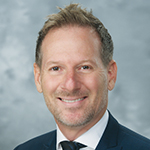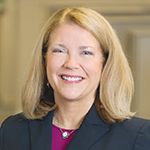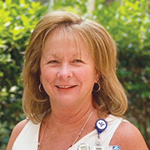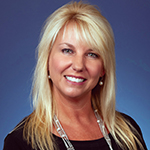By JULIE MINDA
Registered nurse shortages that worsened significantly during the pandemic will continue into the foreseeable future.
Chief nursing executives in Catholic health systems have been addressing that hard reality in part by adapting staffing models, by bringing telehealth nursing to inpatient care and by providing mental health resources to counter burnout. They've also developed additional programs to attract and train nurse graduates.

Trepanier
Sylvain "Syl" Trepanier, Providence St. Joseph Health chief nursing officer, says it's time to start building something new. If providers stick to the same model for the nurse work environment, staffing shortages will only get worse.
Virtual nurse
Providence, Trinity Health and Intermountain Healthcare are among systems that have been honing virtual telehealth nurse teams to free up bedside nurses to concentrate on hands-on patient care. (SCL Health merged with Intermountain in April.)

Health care facilities are looking at how best to improve working conditions for nurses. They are trying new approaches in staffing, technology and wellness support.
Though each system's implementation varies slightly, the general idea is that hospitals are assembling care teams that are a mix of in-person, bedside clinicians and clinicians who are accessible to inpatients via telehealth.
At Providence hospitals, a model currently under development has a nurse and certified nurse assistant working as a dyad at the bedside. Certified nurse assistants can feed and bathe patients and assist with other activities of daily living and can provide basic care under a nurse's supervision. Each bedside dyad is assigned specific patients during their shifts. These dyads are supported by virtual team members including case managers and registered nurses.
Members of the virtual team can be from any of the seven states where Providence is located. They can be summoned at the touch of a patient call button. A separate button calls the bedside team. Virtual team members talk with patients over video screens about their treatment and discharge plans. The virtual team's behind-the-scenes work includes taking care of the majority of documentation in the electronic medical record as well as coordinating discharges to other levels of care or authorizations to receive home care.

Landstrom
Gay Landstrom, Trinity Health senior vice president and chief nursing officer, says that system is pairing seasoned nurses with licensed practical nurses, with some of the care delivered at the bedside and some through virtual connections. The virtual team members — all of them are registered nurses — are doing many of the tasks that do not require hands-on care, such as discharge planning and instruction. They also are mentors and coaches to the bedside team, especially for younger and less experienced nurses.
The executives say that using hybrid in-person/virtual teams comprised of clinicians with a mix of experience levels enables the systems to staff for efficiency because the virtual teams can plug in where and when they are needed. Also, says Trepanier, it helps retain seasoned nurses. He explains that many nurses had been leaving bedside nursing because of the heavy physical demands and the difficulty of meeting patients' care needs while keeping up with administrative tasks. In virtual work assignments, the nurses do not have those physical demands and they are not pulled between bedside care and paperwork.
Shifting team dynamics
Trinity Health, Intermountain and Bon Secours Mercy Health are increasingly employing licensed practical nurses to supplement in-person and virtual care teams.
The scope of practice of licensed practical nurses varies by state, but generally speaking they provide more basic patient care including taking vital signs, administering many medications, dressing wounds and attending to catheters and intravenous lines. They help to keep patients comfortable and must work under the supervision of registered nurses and other clinicians.
The preparation to become a licensed practical nurse involves less academic rigor and less time than the education and training required to become a registered nurse, but the licensed practical nurse role can be a steppingstone to more education and advanced nursing licenses.

Johnson
Robin Johnson, chief nursing officer at Bon Secours Memorial Regional Medical Center in Richmond, Virginia, says that Bon Secours Mercy Health's Richmond market had transitioned to an all registered nurse workforce in its hospitals, but with pandemic-related nursing shortages and the pay commanded by registered nurses, it has reintroduced licensed practical nurses into its staffing model.

Bush
Intermountain Healthcare also is hiring more licensed practical nurses and is having those nurses work to the top of their license. Dina Bush is vice president and chief nursing officer of the Intermountain Healthcare Peaks Region in Montana and Colorado. She says that system has had very positive feedback from care teams about the addition of the licensed practical nurses.
Smoothing the way for student nurses
Worsening shortages of nursing program faculty threaten to limit schools' capacity to continue educating the number of students they have up to now, much less to increase how many students they can graduate. Health systems are exploring how to attract more nurses to teaching and more students to clinical professions.
Bon Secours Mercy Health has initiated within the last year an education support program with the Guild Education company. Bon Secours Mercy Health pays 100% of all part-time and full-time associates' tuition and fees for certain clinical programs, including nursing, medical assistant, and laboratory studies. Bon Secours Mercy Health also provides tuition assistance and tuition reimbursement for 115 academic programs, undergraduate degrees, graduate degrees, and nursing degrees.
In the system's new extern program, nursing students follow a structured path to accepting a nursing position at a Bon Secours Mercy Health facility after completion of their clinical rotations. These students are paired with experienced registered nurses in the hospitals where they want to be hired. The students rotate through multiple units in the hospitals to determine which one is most of interest. There is a 70% retention rate for the externs after graduation.
In May, SSM Health started an externship program that has nursing students training and working alongside SSM Health staff nurses in multiple clinical departments, including on patient floors, and in behavioral health, emergency rooms, and labor and delivery. The externs are paid hourly and receive tuition reimbursement. SSM Health is working with universities so that externs can receive college credit for their externship.
Currently, 78 students from 17 universities in five states — Missouri, Illinois, Kentucky, Arkansas and Ohio — are taking part in SSM Health's program.
Providence and CommonSpirit Health are among systems offering a greater level of structured support to newly hired nurses. Coursework through Providence Clinical Academy is a requirement for new nurses and an option for seasoned nurses in that system.
CommonSpirit worked with Dignity Health Global Education, an affiliate of CommonSpirit's Dignity Health subsidiary, to create a standardized nurse residency program that it offers online to all of its new nurses. On the platform, nurses can get education, mentorship, guidance and clinical training as they begin to practice in the hospital setting.
Safety, well-being
The nursing executives say some top reasons nurses cite for leaving the profession is that they are burnt out and that they do not feel safe, in large part because violence toward staff is increasing. Systems have been giving more attention to these concerns.
Providence has taken numerous steps, including installing panic buttons in some locations and having more officers patrol with canines in emergency departments. Canine patrols have been shown to reduce tension in health care settings.
Its "My Health Matters" program encourages mental health check-ins among peers and provides additional mental health resources to associates who are struggling emotionally. My Health Matters is part of No One Cares Alone, Providence's mental wellness program for staff.
Trepanier says, "The most important aspect of our work is our people, and we must ensure that they stay safe" and that they have access to the resources they need to be emotionally and mentally healthy.